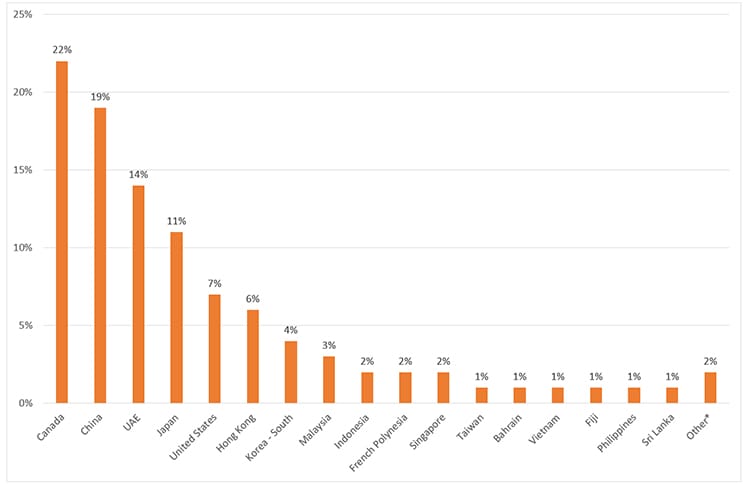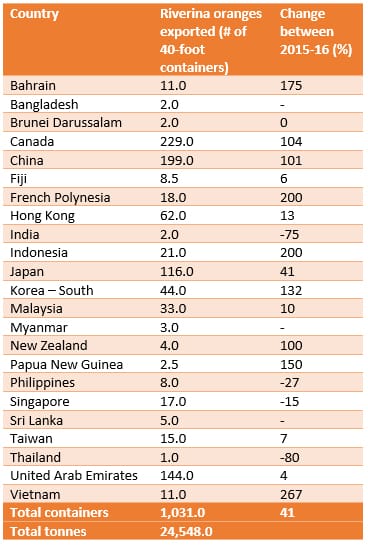21 November 2017
Riverina region targets high value citrus exports
Riverina region targets high value citrus exports
By Sophie Clayton
21-Nov-2017
Key points
- Exports from Riverina grew by 41% from 2015 to 2016
- Canada, China, UAE, Japan and the US are top five export markets for Riverina oranges
- Notable transition from juice production towards higher quality fruit in Riverina

Destination markets for oranges exported from the Riverina region and percentage share of export quantity. *Other refers to New Zealand, Myanmar, Papua New Guinea, Bangladesh, Brunei Darussalam, India and Thailand.
Orange exports from the Riverina region, NSW, grew by 41 per cent in just one year from 2015 to 2016, but there is still room for growth and for more growers to participate and benefit from the opportunity, according to the NSW Department of Primary Industries (NSW DPI).
To quantify Riverina exports, NSW DPI Citrus Development Officer Andrew Creek, based in Yanco, NSW, has started collecting export data from packers in the region, providing reliable information on the varieties and quantities exported, and the destination markets.
In 2016, the top five export markets by quantity for Riverina oranges were Canada, China, United Arab Emirates, Japan and the United States. The five countries that increased their citrus imports the most from the Riverina between 2015 and 2016 were Vietnam (267%), Indonesia and French Polynesia (both at 200%), Bahrain (175%) and Papua New Guinea (150%) all though these increases are from a low base.
NSW DPI wants to continue supporting the increase in exports from the Riverina region with China remaining a key target market given its large population, and increasing wealth and disposable income. Importantly, there is growing interest in, and willingness and ability to pay for, fruit that is grown in more environmentally friendly conditions and without residues.
Andrew visited China in December 2016 and was blown away by the investment in the industry there.
“The size and scale of citrus production and research for the industry in China dwarfs what we have in Australia,” said Andrew. “But there is a market for our high-quality produce and we still have the advantage of our fruit being clean, green and safe, so people looking for those features look to Australian produce.
“There is definitely opportunity for Australia to export more citrus to China and other markets including Korea and Thailand.”
The Riverina region exported 199 40-foot export containers of citrus to China in 2016. Andrew emphasizes that the quality of fruit that China and other export markets wants may be different to what is expected in Australia.
“In China, customers want a lower acid fruit,” said Andrew. “This means growers have to pick at the right maturity.”
Andrew collected export container data from 12 Riverina-based export sheds and there are others who are registered for export or have started the process to register for export. The largest exporting sheds from the Riverina are Pacific Fresh, Marios, Keenan Exports, MFC, Joes Citrus and Toveill. The largest exporter is Pacific Fresh in Leeton, NSW, headed up by its Chair Frank Mercuri.
“We’ve been exporting since 1997 and currently we export around 70 per cent of our fruit,” said Frank. “We send it to China, Canada, Malaysia, Singapore, the Middle East and a little bit to the USA.”
In the past, the Riverina region has been known for growing citrus for juice production, but there has been a notable transition towards higher quality fruit.
“Over the last 10 to 15 years, what with the price of juice, more people have converted to growing navel varieties,” said Frank. “With exports, there are now some really good markets that weren’t there before, which gives you more confidence to grow the fruit.
“China has also come along and changed the whole industry now that we have access. They’ve forced the world price for Australian fruit up in general and now other countries have to pay more for it if they want it.”
Pacific Fresh has about 28 growers who supply them with fruit, many of whom are registered for export to Korea-China-Thailand (KCT) markets, but Frank would like to see them all be registered. This would allow the company to explore more opportunities and support grower profitability.
“We’d like to export all our fruit, the only reason we don’t is so we don’t have all our eggs in one basket and we have some customers in Australia who we have supplied for a long time who we are committed to as well,” said Frank.
One of the cornerstones of supplying export markets is being able to supply a reliable and consistently high-quality product and to meet any protocols set by the importing country or trade agreements.
To help growers get prepared for export, Pacific Fresh provides information and support around export registration and shares pricing information so growers can see why some growers are getting paid more and some are getting less. This provides and incentive for growers to update their management practices and aim for better pack outs.
“You don’t make money from growing ordinary fruit,” said Frank.
He says that you really need to target high quality – especially for export markets – and growers should consider exploring new varieties that may be higher quality and potentially more in demand from importing countries.
“There are always some new varieties out there with better bud wood. A lot of the bud trees that people are using now is from old varieties,” said Frank. “Growers should keep a look out for new varieties to see where they could do better.
“A lot of the red-fleshed fruit is very popular and is doing quite well in China. They like anything that is pinkish or red and has the sweeter flavour – they could take unlimited amounts.
“We’ve got a couple of our own varieties that we hope to have available within the next few years for the industry. One is a red-flesh navel called the late Cara Cara, which should be able to extend our packing season. It’s definitely going to be a good variety for growers to plant.”
The other is a brown-skinned navel. This year Pacific Fresh exclusively supplied seven pallets of this brown-skinned and super sweet navel to one Chinese company – Fruit Day, which sells its produce online. In this case Pacific Fresh have a direct relationship with the customer, but in other cases they work through a trader.
This dynamic approach to exporting is likely key to their success as is their commitment to building relationships over many years with customers.

More information
Andrew Creek, NSW DPI, 0428 934 952, andrew.creek@dpi.nsw.gov.au
Frank Mercuri, Pacific Fresh, 02 6955 7117, frank@pacificfresh.com.au
Membership
You are not logged in
If you are not already a member, please show your support and join Citrus Australia today. Collectively we can make big things happen.
